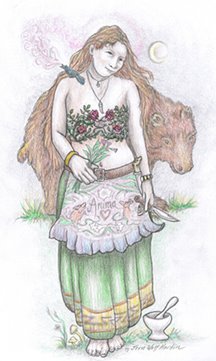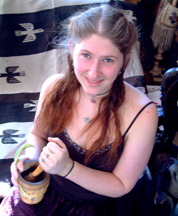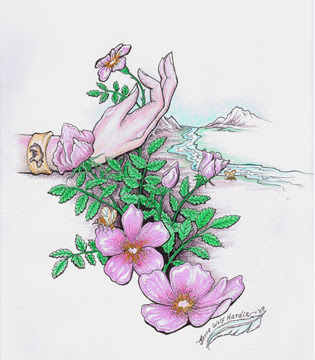1) Healing with food is generally a very gentle, safe and slow way of adjusting the balance of the body. You'll fully assimilate needed nutrition and your inner ecosystem will have the opportunity to integrate the medicine of the whole plant. Food is nourishment, and nourishment is always the foundation for vibrant health.
2) You're much less likely to have any kind of negative reaction to the plant or experience any too sudden changes in your body, spirit or psyche.
3) The enjoyment of the texture and the taste of the plant is usually more pronounced in the context of a sensually flavored meal. It's too easy to miss the subtleties of the herb when you're slugging back a shot of elderberry decoction or sucking down a dropperful of chamomile tincture. Take time to savor your dandelion and watercress salad, the burdock stir fry and elderberry wine. This is great way of becoming more intimate with the herbs.
4) All foods are either medicine or poison, and sometimes the same food can be a poison to one person and a medicine to the other depending on constitution, amount and situation. Consciously adding familiar medicine to a salad or soup will help you to make mindful and healing food choices for all your meals. It will also help you to observe what foods best serve your overall health and wholeness.
5) I'm a fan of honoring traditional wisdom wherever it applies. In most traditional cultures medicine was most frequently consumed as a food, from Chinese herbal soups to Ayurvedic medicinal wines to Appalachian cooked greens to just good old-fashioned chicken soup. This is the kind of medicine anyone can take: babies and elders and the bed-ridden alike, unlike stronger medicines that could easily upset the systems of such delicate individuals.
Be mindful of the effects each food has upon your state of mind and general well being. If garlic upsets your stomach or gives you hives, it doesn't matter how healing garlic CAN be, it's probably not what your body needs at that time. Honor basic energetic truths, if you're already overheated and flushed, avoid dense, oily or spicy foods and try heat clearing foods like dandelion greens and kelp instead. If you constantly struggle with overly dry skin and cracked mucus membranes, focus on moist, sweet foods like sweet potatoes and asparagus.
Resources:
Healing with Whole Foods by Paul Pitchford (Paul focuses on a vegetarian diet within a Chinese medicine approach to whole foods, I do not in most cases advocate a vegetarian diet, but this is a great resource for healing foods).
Full Moon Feast: Food and the Hunger for Connection by Jessica Prentice (A great traditional foods approach to sustainable foods and our individual connection to healing through foods)
The Herbwife's Kitchen, a blog by Vermont herbalist Rebecca Hartman includes numerous great posts on using food as medicine.
This lupus case study by Paul Bergner is a great example of the amazing healing qualities of food, see his references to tonic soups.













3 comments:
I've already mentioned your blog before in my own blogposts (Annetannes kruidenklets/Annetannes herbal chatter), but I think this one merits a translation into Dutch, as not all my readers are reading English very well. Would you mind if I post a translation of this article, of course with giving full credits to you and linking back to your blog?
Warm greetings,
AnneTanne
Dear AnneTanne,
Thank you so much for your sweet comments! Your blog looks lovely as well, I do wish I could read Dutch!
Yes, feel free to translate any of my posts and use them as long you include my name and a link back here :)
Wonderful to meet you!
Blessings,
Kiva Rose
You can find my translation here. The title means 'Let your food be your medicine'.
Warm greetings,
AnneTanne
Post a Comment